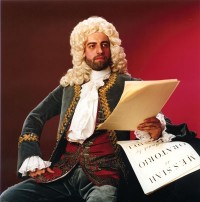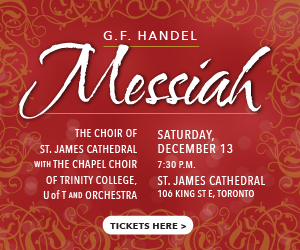 From Medieval times to well into the 19th century, to state in company that December was the month to sing carols would have drawn a quizzical look or a mocking laugh. Carols were lively celebratory songs sung all year round, with dance rhythms and vivid, colloquial lyrics. Their subject matter could be anything from celebrations of the spring planting and the summer harvest, to robust appreciations of good food and drink on a cold winter’s night. Medieval carolers assembling music for dancing at a village party would have regarded Mendelssohn’s stately, regal music attached to Wesley’s poem “Hark the Herald Angels Sing,” as distinctly unpromising.
From Medieval times to well into the 19th century, to state in company that December was the month to sing carols would have drawn a quizzical look or a mocking laugh. Carols were lively celebratory songs sung all year round, with dance rhythms and vivid, colloquial lyrics. Their subject matter could be anything from celebrations of the spring planting and the summer harvest, to robust appreciations of good food and drink on a cold winter’s night. Medieval carolers assembling music for dancing at a village party would have regarded Mendelssohn’s stately, regal music attached to Wesley’s poem “Hark the Herald Angels Sing,” as distinctly unpromising.
In our time, the word “carol” has become a catch-all term for the various musics sung around Christmas time: popular songs, with subjects like the dreaded Rudolph and Frosty, stirring and high-toned hymns like the Mendelssohn mentioned above, plainchant or folk music from diverse sources arranged into massive vocal workouts by modern choral specialists such as Rutter and Willcocks.
One thing that has remained the same from ancient times to the present is that this music is meant to be sung and enjoyed in a group setting. For many people, a carol concert is often the only time in which they are called to raise their own voice, in an era in which music is ubiquitously supplied by electronic means of every type. Little wonder then, at the enthusiasm with which we attend Christmas concerts, and the array of choices that invite us this December.
Christmas concerts are offered by the Bravado! Show Choir (Barrie, 4-6 December), the County Town Singers (Oshawa, 4-5 December), Toronto Accolades (6 December) and the East York Choir has an inventive programme titled “To Drive the Cold Winter Away” (6 December). Other Christmas programmes on the first weekend of December are offered by the Mississauga Festival Choir, Mississauga Children’s Choir, the Toronto Symphony Orchestra, the Bell’arte Singers, the Echo Women’s Choir and the Irish Choral Society of Canada, among others. The following weekend, look for concerts given by the Annex Singers, Kingston Symphony Orchestra and Choral Society, and the Hannaford Street Silver Band in collaboration with Amadeus Choir. A notable concert not concerned with Christmas repertoire this December is that of the visiting Moscow Male Jewish Cappella on 13 December. (See The WholeNote’s listings for details on all of the above.)
On 19 December, the Toronto Chamber Choir gives an intriguing concert of Finnish and Swedish music from the Piae Cantiones. This 1582 collection of Latin songs from Sweden was plundered for its musical riches by English hymn composers in the 19th century, and it’s the source for many well known English language hymns and carols, such as “Unto Us A Boy Is Born” and “Good King Wenceslas.” It should be fascinating to hear melodies from Piae Cantiones sung by an ensemble that specializes in historically informed performance, as an alternative to modern arrangements of ancient carols that are often sugary or bombastic by turns.
Performances of Handel’s Messiah account for another significant aspect of December music-making. While Messiah is not the most difficult choral work in the repertoire, to get through a series of performances with the vocal cords intact requires careful management of the voice, combined with a conductor who utilizes choral forces reasonably. I remember participating in one harrowing Messiah, directed by a conductor who shall remain nameless, in which the dynamic range was forte to triple-fortissimo for almost every chorus. It didn’t help that he was using Mozart’s orchestration, which calls for added brass and woodwind players, who of course learn early on in their training that singers are to be drowned out whenever possible. The audience loved the show, and the conductor came out for repeated bows, stepping across the prostrate bodies of exhausted choristers as he did so.
Toronto concertgoers may choose between Messiah performances by the Elmer Iseler Singers and the Vocal Horizons Chamber Choir on 4 December, Aradia Ensemble’s “Dublin Messiah” (after the original 1742 performance) on 12 December, Tafelmusik’s Baroque interpretation from 16-19 December, and the Toronto Symphony’s series with the Toronto Mendelssohn Choir from 18-21 December. Two sing-along versions are being offered by Eglinton St. George’s United Church (13 December) and Tafelmusik (20 December).
Outside Toronto, there are Messiah offerings by Aradia Ensemble in Port Hope (5 December), the Grand River Chorus in Brantford (6 December), Elora Festival Singers in Elora (13 December) and Orchestra London (16 December).
Notable works other than Messiah are often combined with Carol concerts in December. Britten’s luminous Ceremony of Carols is part of concerts by the John Laing Singers (Hamilton, 5 December), the Toronto Mendelssohn Choir (9 December) and the Toronto Children’s Chorus (19 December).
Bach’s wonderful group of six cantatas that comprise the Christmas Oratorio contain some of his very best choruses and arias. The Pax Christi Chorale performs cantatas IV and V on 5-6 December, and the Toronto Choral Society sings Christmas Oratorio excerpts on 5 December. The latter group reprises part of this programme on 13 December, in a benefit concert for Street Haven Women’s Choir.
The Canadian Sinfonietta and Toronto Cantata Chorus perform Rutter’s Magnificat as part of their “Holiday Sounds from the 20th Century,” the Cantores Celestes Women’s Choir performs Vivaldi’s Gloria (RV58), and the Jubilate Singers sing Charpentier’s delicate Messe de Minuit, all on 5 December.
In the aftermath of such seasonal festivities, January is generally understood to be Worldwide Choral Hangover Month. Singers soak their throbbing vocal cords in hot chocolate or more grown-up substances; choir librarians gaze in dismay at the piles of music to be re-filed; conductors put icepacks on their forearms and ignore the phone. In other words, we’re all hibernating in January. But a few concerts stand out for those not sated by December offerings.
The Grand Philharmonic Choir and Kitchener-Waterloo Symphony weigh in with The Dream of Gerontius on 16 January, as part of the ongoing celebrations of Howard Dyck’s final season as conductor of the GPC. On 30 January The Elmer Isler singers and the Toronto Children’s Chorus combine with the Polish Chamber Choir in a concert of works by Penderecki, Gorecki, and Palej, in collaboration with Soundstreams.
Looking ahead to February, the Georgetown Bach Chorale will mount a programme that includes the Allegri Miserere and Bruckner’s setting of Christus factus est (6 Febuary), and the John Laing Singers will sing works that include the Fauré Requiem and Britten’s Festival Te Deum (February 7). These are slim pickings compared to December’s riches – but elegant and intriguing choices worth seeking out in the cold first weeks of the new year.
Benjamin Stein is a tenor and theorist. He can be contacted at: choralscene@thewholenote.com.



